Remembering The Station nightclub fire
All these years after the nation's fourth worst nightclub fire, Rhode Island is still dealing with the collective trauma, legislative fallout and lasting impacts of The Station nightclub fire.
The West Warwick, Rhode Island club The Station was purchased by brothers Michael A. and Jeffrey A. Derderian in 2000 and three years later became a scene of tragedy that would haunt Rhode Island forever. As the California band Great White took the stage that February night in 2003, pyrotechnics ignited soundproofing foam insulation which resulted in a massive blaze.
Many were left with questions:
Who was to blame?
What was the band's role?
How high would the death toll climb?
Survivors, families, friends, firefighters, doctors and nurses were left to carry the physical and emotional scars of that night. For everyone who was involved, the memories still haunt them.
Fifteen years after that deadly night, the rubble cleared away, The Station Fire Memorial Park opened as a place for victims, family and friends to come and remember.
What was The Station nightclub fire?
On February 20th, at 11:07 p.m. The Station nightclub on Cowesett Avenue and Kulas Road in West Warwick, Rhode Island, caught fire as the band Great White shot off pyrotechnics to punctuate its entrance on stage. Within minutes the building was engulfed in flame and toxic smoke as the highly flammable polyurethane foam glued to the nightclub’s walls as soundproofing ignited. The evacuation of the building turned to chaos as patrons surged toward the exits. West Warwick police officer Mark Knott radioed headquarters: “Stampede.”
The main exit becomes clogged with a pile of clubgoers who had tripped in the surge.
All told, 100 people were killed either in the fire or as a result of their injuries and it became the nation's fourth deadliest nightclub fire.
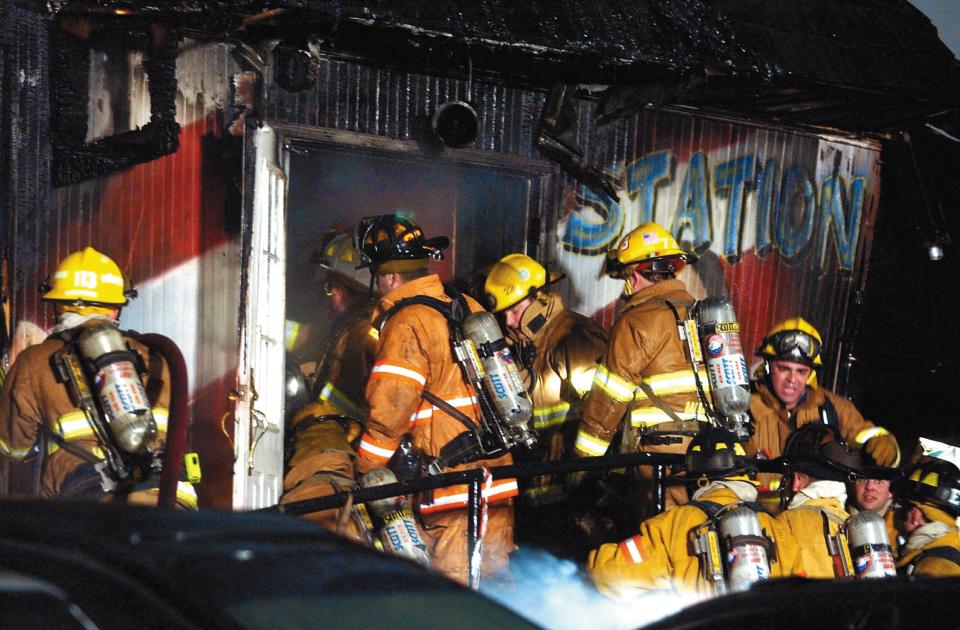
The Station fire: A Timeline of the tragedy
More: Should PTSD qualify for injured-on-duty status? Firefighter and RI state Rep. talks trauma
How many people died in The Station nightclub fire?
The Station nightclub fire killed 100 people and injured more than 200.
The fire started at the West Warwick club when a manager for the band Great White set off pyrotechnics for the band's show. The sparks ignited foam soundproofing that lined the club's walls. Fueled by the flammable foam, the fire spread quickly, trapping many people inside.
More on the fire: The Station fire: 100 victims in photos
Who was responsible for The Station nightclub fire
Four parties found themselves at the center of the finger-pointing in the wake of the fire:
The 1980s rock Great White and its lead singer Jack Russell (playing as Jack Russell's Great White) for putting together the show as part of a tour of roadhouses seeking to rekindle past glory.
Band road manager Daniel Biechele, for triggering the pyrotechnics that sparked the fire.
Brothers Michael and Jeffery Derderian, who owned The Station nightclub, for using highly flammable polyurethane foam as soundproofing on the walls of the club and for letting 462 people into a building, bringing it over capacity.
Town fire inspector Denis P. Larocque, for not noticing the foam during an inspection a few months before the fire.
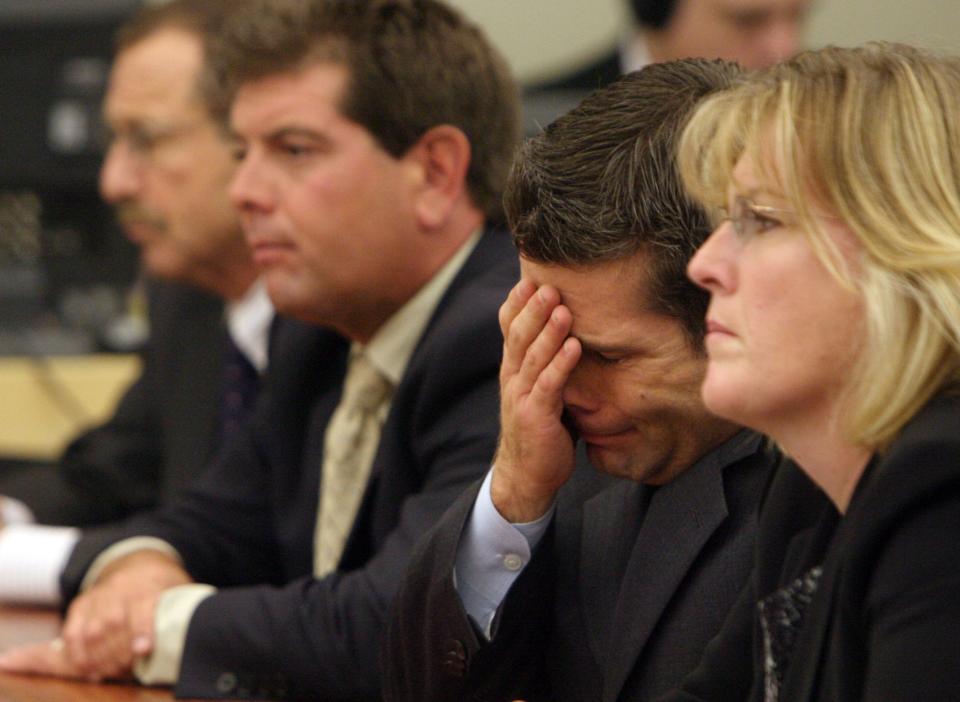
Biechele and the Derderians, the only people ever charged in connection with the fire, each pleaded to 100 counts of manslaughter — Biechele pleading guilty; the Derderians, no contest.
Biechele and Michael Derderian were sentenced to four years in prison, though each was let out early. Jeffrey Derderian was sentenced to community service.
Biechele and Great White, the Derderian brother, Larocque and the town of West Warwick — plus a host of others — figured into lawsuits that led to a payout of $176 million to those who were injured and the families of those who died.
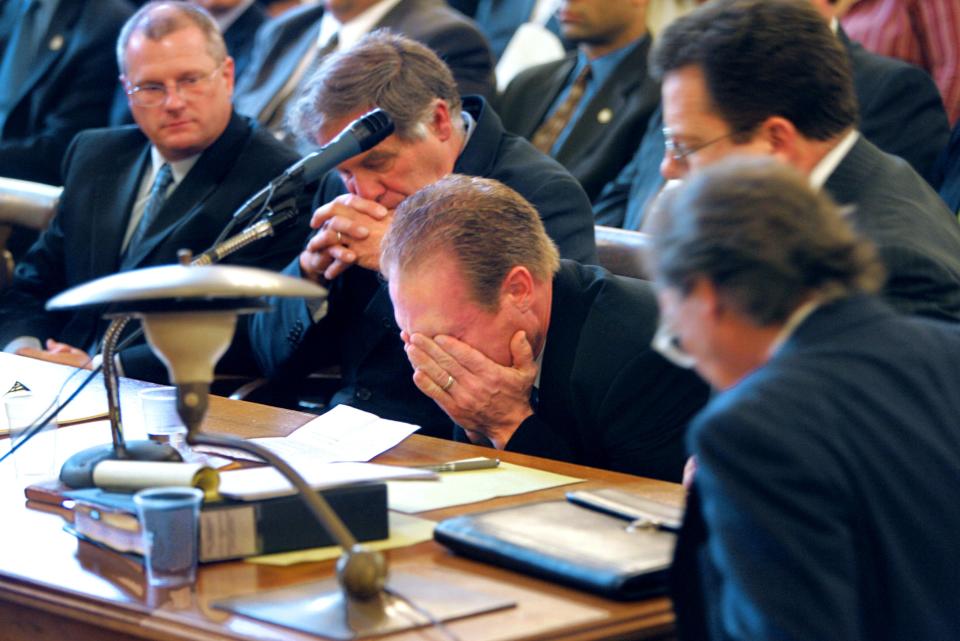
Station owners silent as fire's 10th anniversary nears: The Derderian brothers, who purchased the West Warwick, R.I., nightclub in 2000 with hopes of making it a thriving business, still draw anger, and resentment from victims, and their families.
The Derderian brothers were targets of criminal investigations and civil lawsuits. Trials were averted through plea bargains and monetary settlements, though neither brother paid a penny of his own money toward the $176 million that went to the victims and their families.
The Derderians are on a 'white-wash tour' in 2021 about The Station fire, says father who lost son: Over the years Dave Kane has had to find a place to store his outrage over losing his 18-year-old son, Nicholas, in The Station nightclub fire in 2003.
But as he watched on television in 2021 the former club owners, brothers Jeffrey and Michael Derderian, on their “whitewash tour” of the truth go unchallenged by the reporter and producers of "48 Hours," he felt that agitation rising up in him again.
Station fire: He lost his brother but didn’t blame the Derderians: The Derderian brothers became pariahs after the fire, ostracized and blamed for the tragedy. But not by Jody King.
When others turned away from the Derderians, King remained. The day after the fire, before a medical examiner confirmed that his brother was among the dead, King was on the phone with the Derderian brothers and wept with them. It wasn’t about forgiveness for the death of his brother, because he never blamed them.
“This was a mistake,” King said. “We all make mistakes. We make them every day, and we hope it doesn’t cost a life.”
The former salesman for the company where the Derderians bought the deadly insulating foam says the fire destroyed his life: Barry Warner a foam salesman and neighbor of The Station nightclub suggested to the Derderians that they look into spray foam as an option to muffle the noise of the club. Now, he carries the fallout of that suggestion with him everywhere.
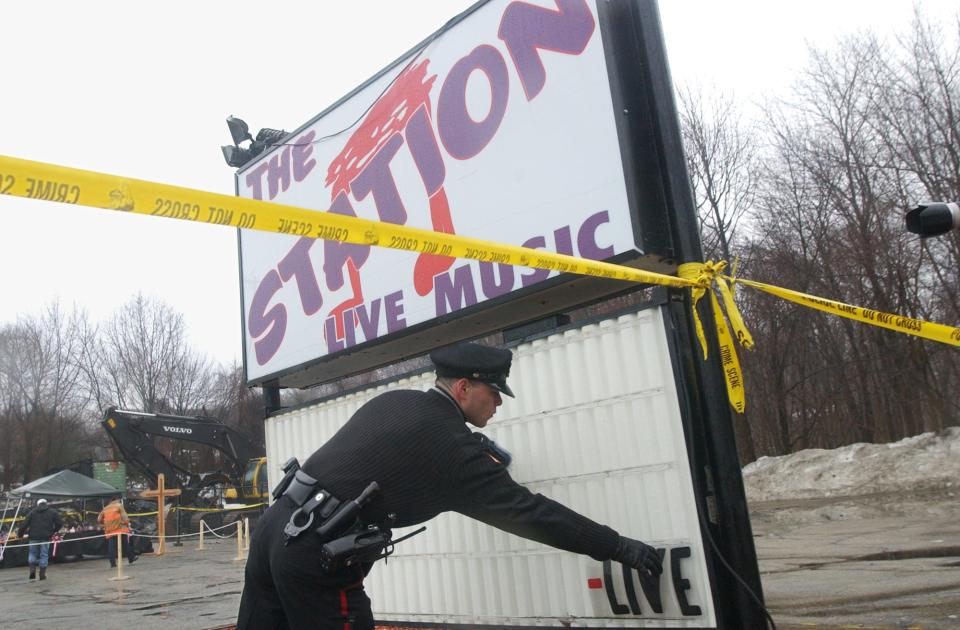
What band was playing at The Station fire and what was their role?
After prison, Biechele rebuilding life in Fla.: Former tour manager who lit the pyrotechnics has left music industry behind, his lawyer says.
How tragedy inspired one member of Great White: After the fire, Mark Kendall, guitarist for Great White, drew close to some survivors, and relatives and friends of those who died and were injured. What he calls a “fellowship” has endured. Anniversaries, he says, renew the ties and allow him to reflect and recount his version of events that fateful February 20th night.
Station Fire Memorial Foundation rejects donation from Great White singer: The lead singer of the band whose fireworks touched off the Station nightclub fire that killed 100 people was forced to search for a new charity to be the recipient of money to be raised at a benefit concert in California.
Why is it important to Rhode Island and what were the lasting changes?
Six months after the fire the state had already started passing updated fire safety regulations in the fall out of the fire, Governor Carcieri signed into law the Comprehensive Fire Safety Act of 2003, a major rewrite of the state’s fire-safety code. It requires sprinklers in every nightclub serving more than 150 people.
Out of the ashes of the Station fire, tougher building codes arose: R.I.'s fire safety rules changed from arcane and confusing to a modern code more easily understood.
But there is more to be done. In many communities, the crucial task of inspecting buildings in search of potentially life-threatening fire hazards falls to just one person.
The Station fire changed how we view fire safety. But has prevention actually improved? In many communities, the crucial task of inspecting buildings in search of potentially life-threatening fire hazards falls to just one person.
In rural towns and villages, that individual may have another full-time job, or even be an unpaid volunteer. In urban areas, high turnover means that fire marshals rarely stick around long enough to learn all the nuances of the code.
Fire safety work goes on: Advocates gather at Station memorial to mark tax law easing cost of sprinklers
The Station Fire Memorial Park:
For annual late-night Station remembrance, memorial a peaceful, meaningful addition: On the 15th anniversary of the deadly nightclub fire, a peaceful memorial opened for the victims, family members and survivors and so that all of Rhode Island would remember.
Station fire memorial nearing completion: Organizers say they have raised more than $1.9 million of the $2 million needed to build it and maintain it in perpetuity.
Hundreds witness groundbreaking for Station fire memorial: Cradling fresh flowers in the frigid cold, several hundred people gathered at the site of The Station nightclub fire on the 10th-anniversary service that included a groundbreaking for a permanent memorial and remembrances for the 100 lives lost.
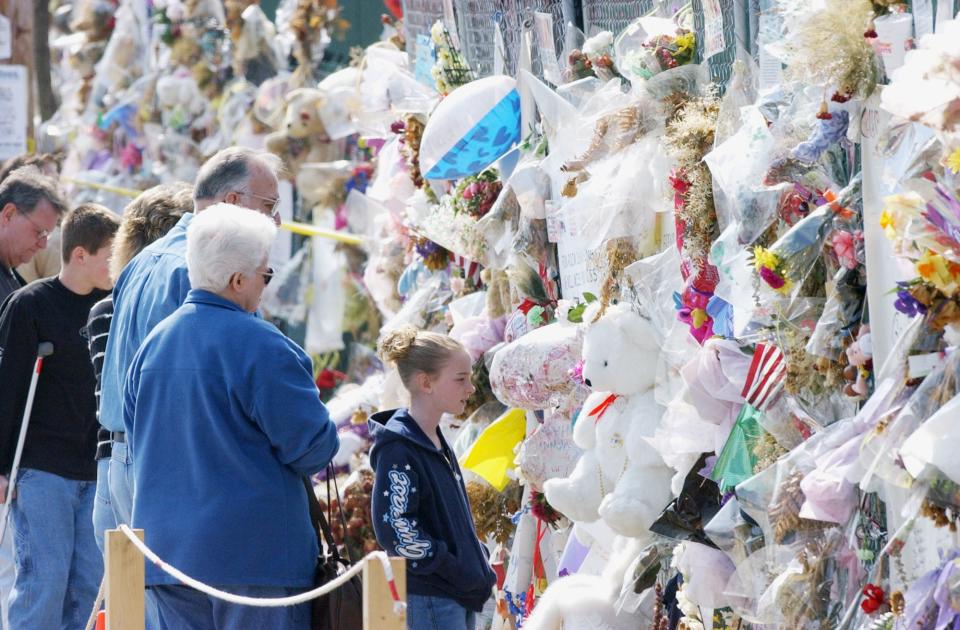
Firemen, doctors and journalists: For everyone who was involved that night, the memories still haunt them
Medical teams met the challenge; everyone who got out survived that night: Whatever their memories, the medical professionals who helped the victims of the Station nightclub fire 10 years ago have one thing in common: they will never forget.
In firefighters' hearts, the disaster isn't over: How long can a memory feel like a live wire arcing against your heart? When just brushing against it — an overheard reference, a roadside glimpse — can rekindle the searing pain?
Forever? Perhaps.
Quiet, ‘emotional’ end for Station fire remnants: The more than 700 pieces of evidence, trucked from the Cranston warehouse where they had been held in evidence storage, were destroyed.
RI Hospital specialists, Station fire victims reflect after a decade since deadly blaze: “What happened that evening and for the ensuing four weeks was unprecedented in our hospital,” said Dr. David T. Harrington. “We ran two operating rooms for almost three weeks, five days a week.”
2.10.13: 'It went up like a match. Everything went black': For reporters, tragedy, disaster and sorrow come with the territory. But for Karren Lee Ziner, staff writer for the Providence Journal, who was the first on the scene that February night, The Station fire was its own special nightmare and it still haunts her.
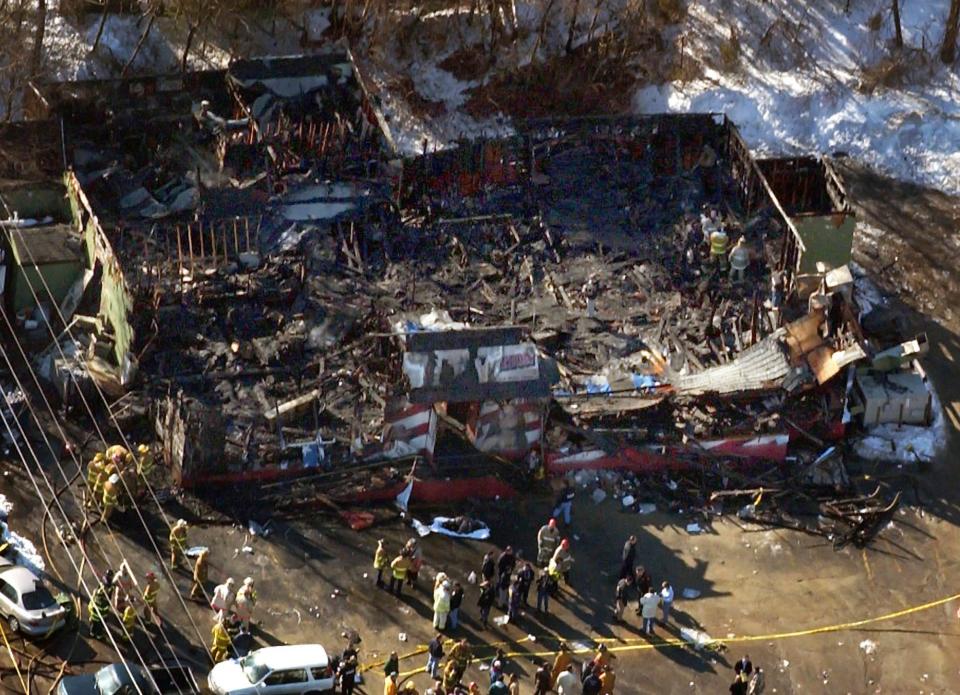
Survivors of the deadly fire tell their tale:
Station fire, 15 years later: Survivors tell their stories: While many say they will never get over it, they have found a way to get along with it. Survivors and friends of survivors active in the effort to turn the nightclub site in West Warwick into a memorial park recount the emotional journeys that brought them from 2003 to 2018.
Station nightclub fire survivor tells burn victims love can happen amid scars, fears: Joe Kinan has had more than 120 surgeries, not the least of which was a hand transplant. He was the most badly burned survivor of the 2003 Station nightclub fire. He suffered third- and fourth-degree burns to over 40 percent of his body and was comatose for three months. He lost his fingers and ears as well as the sight in his left eye, along with much of his nose tissue.
Now he has a message for others struggling to come to terms with their disfiguring scars and fears of rejection: “Take me as I am or keep walking.”
Son of Great White guitarist cheers sick children to honor his dad: His father would be proud; Beat goes on through son of Great White guitarist killed in fire
Gina Russo says she emerged from the flames in a better place: But 10 years after the fire killed her fiancé, after 54 operations and skin grafts to heal her burned body and treat recurring complications; after periods of sadness, anger and frustration over who was lost, who wasn’t prosecuted, who never apologized, Russo says she is grateful.
Fused by pain, Station fire survivors, loved ones mark 18th anniversary: “They’re all here. They died here,” Jody King said of the 100 people who died. Another 230 people were injured in what ranks as the nation’s fourth-deadliest nightclub fire.
“People come here to cry. People come here to reflect. People come here to remember,” said King, who wears a tattoo of his brother on his chest.
They're sustained by family and faith: Meet the Darby family. The father of Jessica and Sarah as well as Melinda’s husband, Matt, died in The Station fire. Melinda was eight months pregnant at the time. She and Matt knew they were expecting a girl and they had already chosen her name. On the day he died, Matt kissed his wife’s stomach and said: “God, I wish she’d come today.” Now, ten years later the family reflects on the many challenges and losses life has thrown at them.
This article originally appeared on The Providence Journal: The Station nightclub fire: What happened, how many died, who was responsible

 money
money 